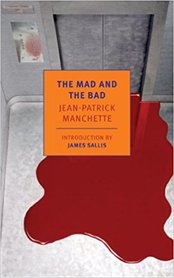
My personal experience with The Mad and The Bad was a frustratingly mixed affair.
And here's where my goût comes in. For each intriguing choice or detail Manchette incorporates, I am left trying to connect it to a larger theme or grander design, but to no great success. Ultimately, many of these details feel like quirk rather than compelling symbolism, although I will freely admit that I am no expert on the French political obsessions that James Sallis, in his introduction to the paperback edition, argues drives Manchette's work. In several instances, the book feels as if it's not interested in higher ideas or deeper subtexts; it wants to deliver thrills and action and beguile the reader to keep turning pages. On this level, I think, it generally succeeds.
But what are we to make of Julie, newly released from a mental institution, who is plagued by manic-depressive moods and a dislike for humanity, her young charge included? Julie is described twice as looking mannish, like a "post-op transsexual." This is one of those intriguing details to which I allude above. It is clear that Manchette doesn't want her viewed as the traditional soft heroine in jeopardy. She is resourceful enough to keep ahead of her pursuers and to fight back when she is able, but she is hardly a sympathetic protagonist. When a male motorist picks her up while she is on the run, it is Julie who initiates the idea of a sexual encounter, only to bludgeon him to death as soon as he has stopped the car. This moment might be covered under the larger pessimism of neo-noir sociological theory -- everyone's a killer, and no one is innocent -- but it also serves to distance the characters from the reader without any greater understanding or catharsis taking place.
The other principal character who operates (in my opinion) on a level of faux-métaphore is the terminally ill -- or maybe just scabrously ulcerous -- hired killer, Thompson. As he pursues Julie and the boy Peter, an inner cancer is eating him up from the inside out (his chosen profession? his quest for money?). As he tries to aim his rifle, tears fill his eyes and bile and blood spray from his mouth. The concept isn't a bad one, but Manchette here has the disadvantage: the relentless crime-story character who needs to finish a job before he is eaten alive had been explored to much more satisfying effect years earlier by Friedrich Durrenmatt in The Judge and His Hangman (1950). Durrenmatt managed to combine metaphor and theme throughout his book in a way that never quite gels in The Mad and the Bad; at the end of Hangman, one knows exactly what all of the lies, deaths, and surreal images have amounted to. With Manchette, his prose reads like a screenplay, with action first and greater meaning to be extracted from the carnage a distant second in intention.
And that's okay; it's just not my particular cup of beef broth. There is one moment in The Mad and the Bad which proved a fascinating exercise in subjective perspective when writing prose. In a movie, one can generate suspense through parallel editing and storytelling: cut to Thompson in the car, looking up at the house. Then cut to the trapped Julie, noticing the car. Cut back to the killer, slipping on grass, bent over, trying to climb the hill with his weapon in hand, cursing as he falls. Cut again to Julie, frantically looking in the house for the boy.
In a screenplay, there's no problem. But prose fiction needs a unifying point of view within a moment, even if the story is being related in third person. Manchette obeys this rule in nearly every one of his book's short chapters -- if it's a Julie scene, we don't switch setting and perspective to another character until the next scene begins. For the length of a few pages in The Mad and the Bad, however, the reader is asked to jump from one point of view to another, ping-ponging back and forth during the climactic confrontation. It feels jumbled and it doesn't work because we’re asked (all too briefly) to be inside the heads of both characters in quick succession. I'm grateful for this example because it helps to inform my own writing.
And that's perhaps the most sincere accolade I can give this book and its author: I'm grateful for experiencing a story that was fast-paced and focused, with unconventional characters. But I'm also frustrated that closer examination and further reflection doesn't reward those efforts, but only provides diminishing returns.
 RSS Feed
RSS Feed